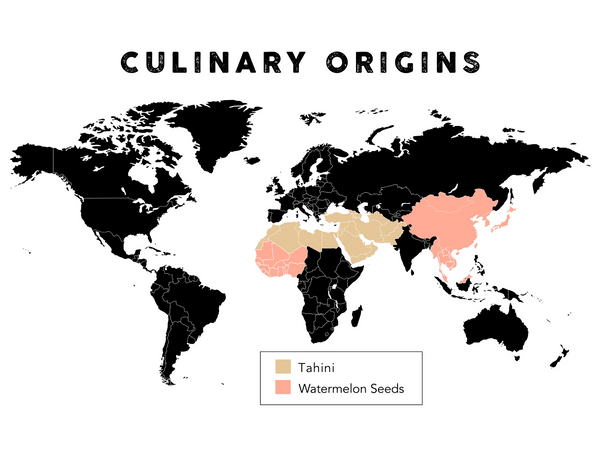Watermelon Seed Butter, prepared using shelled watermelon seeds, is a multipurpose spread comparable to tahini that contains additional protein, vitamins, and minerals.
What's the difference between Watermelon Seed Butter and Tahini?
When comparing sesame seed butter vs tahini, Watermelon Seed Butter stands out. Watermelon Seed Butter, unlike sesame-based tahini, includes more protein, magnesium, potassium, and omega-6 fatty acids, which makes it a more nutritious and sustainable choice. It also performs well as a paste in soups and sauces.
Watermelon Seed Butter is a unique spread made from the shelled, roasted white seeds in watermelons. It has a mild, earthy flavor that many have compared to tahini, a spread made from sesame seeds that is popular in Middle Eastern cuisines. Like tahini, Watermelon Seed Butter is one of those unique ingredients that works equally well in sweet and savory recipes. Watermelon Seed Butter can be used as a substitute for tahini, and it brings even more nutritional benefits to the table. Plus, with sesame becoming a rising food allergen, Watermelon Seed Butter is a spread everyone can enjoy.
We’re giving you the many reasons for swapping out your tahini for Watermelon Seed Butter. We find it wins on texture, protein, and many vitamins and minerals, while also being more sustainable. Grab a jar for yourself to do your own at-home comparison.
FLAVOR & TEXTURE

NUTRITION
When we compared the nutritional benefits in a serving of watermelon seeds to sesame seeds, watermelon seeds came out on top almost every time. They are higher in protein, magnesium, potassium, and essential omega-6 fatty acids while sesame seeds are higher in fiber and iron. They both share roughly the same amount of healthy unsaturated fats, zinc, and calories.

Protein is necessary for every function in our body to run properly. The high protein content of watermelon seeds helps our hormones function and helps build and repair our muscles.


The higher amounts of magnesium and potassium in watermelon seeds may help to keep blood pressure in a healthy range and stave off blood sugar spikes.

Omega-6 fatty acids have powerful anti-inflammatory and brain-boosting benefits and may help lower your risk of cardiovascular disease, cancer, and respiratory disease.

The high amounts of fiber found in sesame seeds can help improve digestive health, lower cholesterol, and even reduce the risk of heart disease and diabetes.

The higher amounts of iron in sesame seeds can help promote strength and endurance by supporting bone strength and carrying oxygen to your muscles and brain.
SUSTAINABILITY

While watermelon seeds are harvested from the inside of a watermelon, sesame seeds are harvested from small, delicate pods that grow from the stems of tall, leafy stalks. Each crop has its own special growing requirements, one of which is the water used to grow them. Seeds in general use far less water to grow than tree nuts, but there are also differences among the water use of seeds themselves. Watermelon seeds end up using 10 times less water to grow than sesame seeds, making them a far more sustainable crop to grow in terms of their water footprint.
ORIGINS

Whole roasted and salted watermelon seeds are a popular snack throughout Asia. They’re also pressed into an oil, called ootanga oil or kalahari oil, in many countries within West Africa. Watermelon Seed Butter, however, is a new product for the US market. Tahini is a popular ingredient in Eastern Mediterranean, Middle Eastern, Northern African, and Southern Caucasus cuisines.
HOW TO USE

Watermelon Seed Butter and Tahini can both be used in a similar way in sauces and dips, like hummus and baba ganoush. But Watermelon Seed Butter acts as a better emulsifier when added to soups and dressings because it incorporates smoothly into both oil and water. You can even use Watermelon Seed Butter as a dairy replacement, like our vegan queso. And because of its higher protein content, Watermelon Seed Butter is a great addition to smoothies instead of adding a chalky protein powder. There are endless ways to use Watermelon Seed Butter in the kitchen, so start experimenting!




